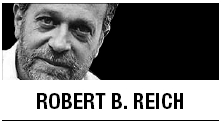Labor Day is traditionally a time for picnics and parades. But this year is no picnic for American workers, and a protest march would be more appropriate than a parade.

Not only are 25 million unemployed or underemployed, but American companies continue to cut wages and benefits. The median wage is still dropping, adjusted for inflation. High unemployment has given employers extra bargaining leverage to wring out wage concessions.
All told, it’s been the worst decade for American workers in a century. According to Commerce Department data, private-sector wage gains over the last decade have even lagged behind wage gains during the decade of the Great Depression (4 percent over the last 10 years, adjusted for inflation, versus 5 percent from 1929 to 1939).
Big American corporations are making more money, and creating more jobs, outside the United States than in it. If corporations are people, as the Supreme Court’s twisted logic now insists, most of the big ones headquartered here are rapidly losing their American identity.
CEO pay, meanwhile, has soared. The median value of salaries, bonuses and long-term incentive awards for CEOs at 350 big American companies surged 11 percent last year to $9.3 million (according to a study of proxy statements conducted for The Wall Street Journal by the management consultancy Hay Group). Bonuses have surged 19.7 percent.
This doesn’t even include all those stock options rewarded to CEOs at rock-bottom prices in 2008 and 2009. Stock prices have ballooned since then, the current downdraft notwithstanding.
In March 2009, for example, Ford CEO Alan Mulally received a grant of options and restricted shares worth an estimated $16 million at the time. But Ford is now showing large profits ― in part because the UAW agreed to allow Ford to give its new hires roughly half the wages of older Ford workers ― and its share prices have responded. Mulally’s 2009 grant is now worth more than $200 million.
Last year, Ford reinstated merit-pay raises and matching 401(k) contributions for its salaried workers, but not hourly workers ― further widening the gap between the top and everyone else.
That’s in stark contrast to Henry Ford’s decision almost a century ago to pay his hourly workers three times what the typical factory employee earned then. He was roundly criticized by other executives, but the founder of Ford Motor knew it was a cunning move. The higher wage turned Ford’s autoworkers into customers who eventually could afford to buy the Model Ts they were making.
Henry Ford understood something today’s CEOs seem to have lost sight of. Workers are consumers.
Consumer spending in America is now 70 percent of the U.S. gross domestic product. So when jobs and wages are under assault, Americans cannot keep buying as before. The result is a U.S. economy that has now all but stopped growing.
You can get a sense of how lopsided the economy has become when you look at the relationship between corporate profits and wages. Since World War II they have moved in roughly the same direction. When profits have risen, wages have risen as well. When profits have declined, companies have either laid off workers or reduced their hours.
But recently that connection has been broken. Corporate profits have continued to soar, yet big companies have continued to lay off their workers and cut wages and benefits. In fact, the ratio of corporate profits to wages is now higher than at any time since just before the Great Depression.
Corporate profits keep rising because companies are selling abroad while they’re simultaneously cutting their labor costs in the United States.
This can’t go on indefinitely. The world’s biggest economies outside the U.S. ― India, China, Europe, Brazil ― are all slowing. They have plenty of their own consumers, but they also depend on exports to the United States. Yet American consumers can no longer buy. We’ve come full circle.
Perhaps there would still be something to celebrate on Labor Day if government was coming to the rescue. That’s what it did in the first decade of the 20th century when giant corporations threatened the economy, and then again in the 1930s when American workers didn’t have the money to keep the economy going.
But this time Washington is paralyzed. The president seems unwilling or unable to take on labor-bashing Republicans. At the same time, several Republican governors are mounting direct assaults on organized labor (see Indiana, Ohio, Maine and Wisconsin, for example).
So let’s bag the picnics and parades this Labor Day. American workers should march in protest. They’re getting the worst deal they’ve had since before Labor Day was invented ― and the economy is suffering as a result.
By Robert Reich
Robert Reich, a former U.S. secretary of labor, is a professor of public policy at the University of California at Berkeley and the author of “Aftershock: The Next Economy and America’s Future.” ― Ed.
(Tribune Media Services)





![[Weekender] Korea's traditional sauce culture gains global recognition](http://res.heraldm.com/phpwas/restmb_idxmake.php?idx=644&simg=/content/image/2024/11/21/20241121050153_0.jpg)


